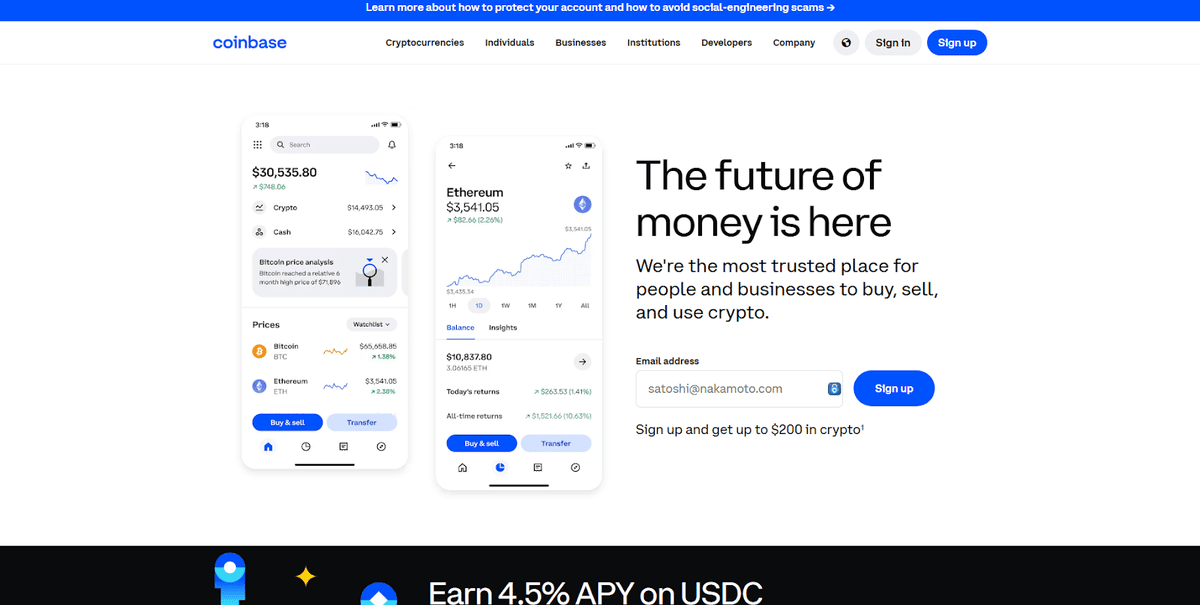Is Spokeo a Scam?
Laura Martisiute
Reading time: 9 minutes

Table of Contents
If you’re thinking of using Spokeo, you need to know: Is Spokeo a scam?
Below, we explain whether Spokeo is a scam and discuss some steps you can take to improve your safety when using this website.
What Is Spokeo?
Spokeo is a people search website.

It lets you search for other people’s personal information.
If you know someone’s full name/email/phone number/address, you can find other information about them.
Spokeo reports typically include the following data points:
- Contact information, e.g., names, email addresses, and phone numbers.
- Personal details, e.g., birth information, education, interests, and marital status.
- Family and associates, e.g., family member details, birth and marriage records, and household demographics.
- Location history, e.g., current and past addresses, who lives at these addresses, and neighbors.
- Social media accounts, e.g., usernames and social media and dating accounts.
- Wealth data, e.g., estimated salary, property, and investments.
- Criminal records, e.g., DUIs and sex offenses.
According to the Spokeo website, it has 6 billion consumer records and 89 million business records.
Spokeo can send you updates when it adds new information to the reports of people you’re interested in.
The website is used both by consumers and by businesses who want to connect with their customers.
Is Spokeo a Scam?
No, Spokeo is not a scam. It’s a legitimate people search website.
You can use Spokeo to find information about someone, for example, a friend, family member, classmate, neighbor, online seller, date, acquaintance, and unknown number.
Spokeo reports provide information like:
- Phone numbers.
- Email addresses.
- Current and past addresses (including information about properties, like estimated value and square footage).
- Court records.
- Social media profiles.
- Age.
- Date of birth.
- Marital status.
- Interests.
- Marriage, divorce, and death records.
- Potential family members and their details.
- Household interests, e.g., “has pets,” “satellite TV,” and “pool.”
- Household income.
- Employment.
Here’s a sample Spokeo report.
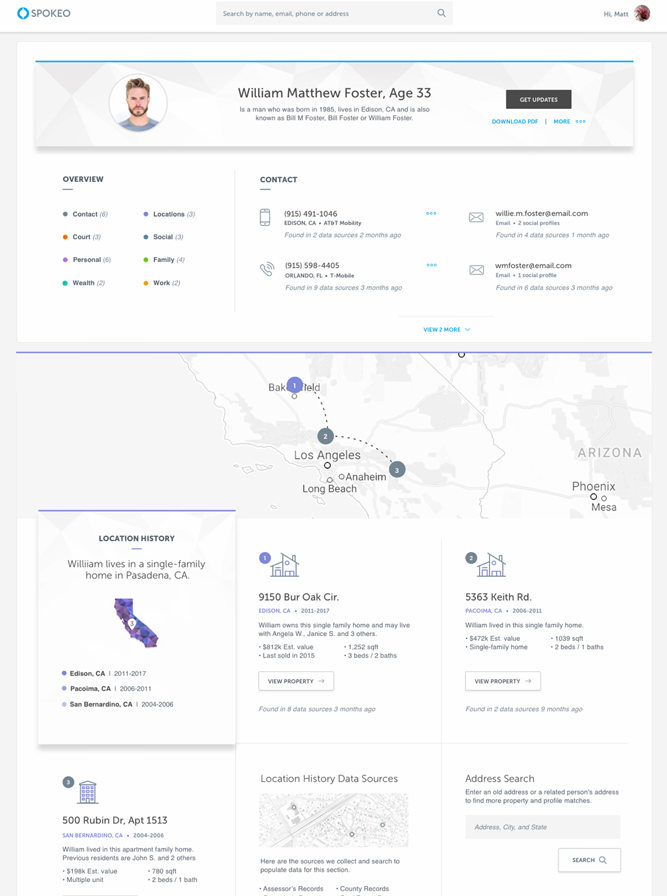
Spokeo gets mixed user reviews:
- 2.3 out of 5.0 stars (from 1,098 reviews) on Trustpilot.
- 1.2 out of 5.0 stars (from 829 reviews) on Consumer Affairs.
- 2.2 out of 5.0 stars (from 1,359 reviews) on Sitejabber.
- 1.13 out of 5.0 stars (from 188 reviews) on Better Business Bureau.
The biggest complaint is around unexpected charges.
Many people say they paid what they thought was a one-time trial cost of $0.95 to access someone’s personal information on Spokeo but ended up being charged $29.95 monthly.
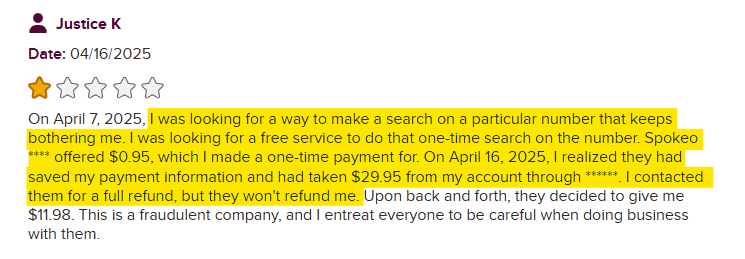
Spokeo has responded to some of these complaints, saying its subscriptions renew automatically, so unless a customer cancels their trial, Spokeo will charge them the full monthly price after the trial ends.
Spokeo reportedly automatically enrolls everyone into its subscription.
According to one person who used Spokeo, they didn’t click on any links or tabs that would enroll them into Spokeo automatically. When they called Spokeo, they were apparently told that it doesn’t matter what you buy; you’ll always be auto-enrolled into Spokeo’s monthly subscription.
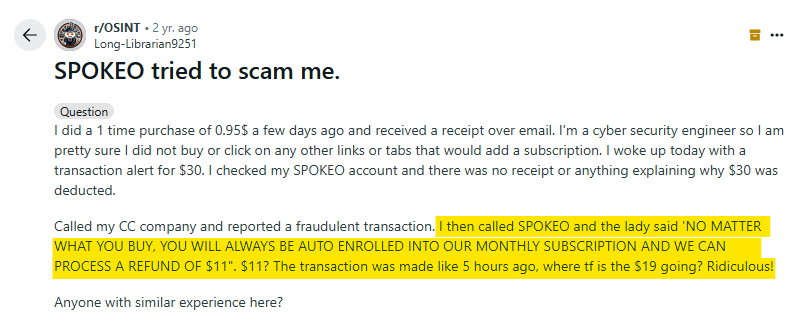
Spokeo does make this clear in its Payment Policy:
“If Your trial remains uncancelled (by You) after expiration, then the trial shall convert to an ongoing subscription in accordance with the terms of that particular trial offer.”
It also says that you cannot get your money back if you cancel after the trial upgrades to the premium subscription.
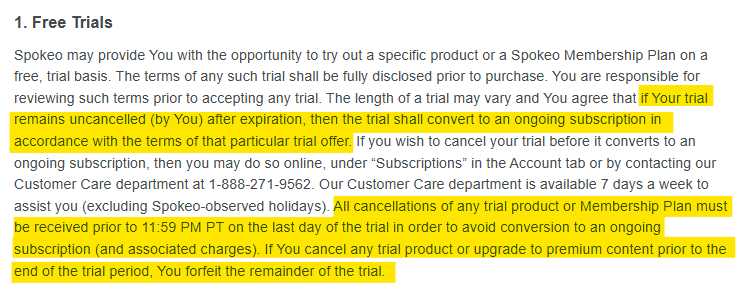
People have also complained about Spokeo not offering a refund after they’ve realized their mistake and canceled the service.
The company says that canceling Spokeo only stops the subscription from renewing. It does not offer refunds.
Other customers were disappointed that paying $0.95 for a trial did not show them full information on someone (i.e., they would have had to pay another $9.95 for additional information).
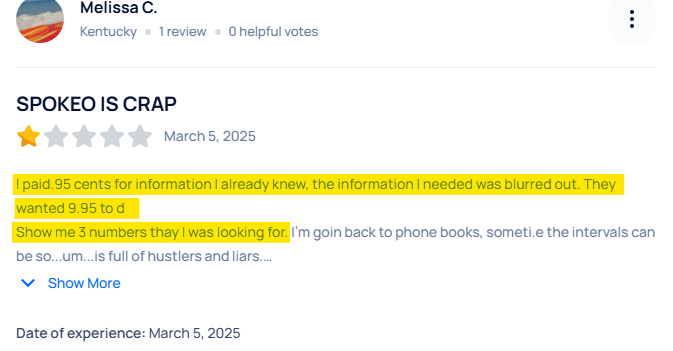
Spokeo is Better Business Bureau accredited and has an “A-” rating.
Spokeo data accuracy
As is the case with all people search sites, the accuracy of the information published on Spokeo can vary.
Some data points may be correct, whereas other data points may be outdated or wrong.
For example, one person says that Spokeo often gives them old addresses for people. Another person says that according to Spokeo, their dad is alive, even though they passed away 30 years ago.

Spokeo acknowledges this in its terms of service.
It says it aggregates publicly available data from various sources like social networks, phone books, and real estate listings and does not verify that the information they publish about people is correct.
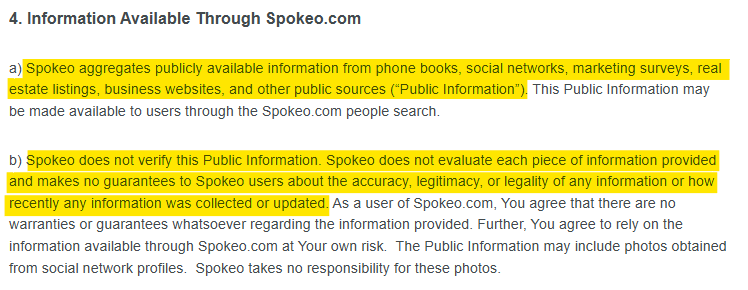
Spokeo risks to YOU as a user
Just like you can use Spokeo to find information about someone, other people and malicious individuals/groups can also use Spokeo (and other people search sites) to find data about you.
They can then use it for doxxing, harassment, stalking, identity theft, scams, and more.
People search sites such as Spokeo can also be used by businesses to target you with personalized ads, employers to determine your suitability for a job, landlords to decide if they want to rent a property to you, and insurers to raise a premium.
On its website, Spokeo says that it is not a consumer reporting agency and that the data it provides cannot be used for making decisions about credit, tenant screening, and employment. However, it does not vet its customers.
For this reason, we recommend you opt out of Spokeo. You’ll still be able to use the website, but other people won’t be able to use it to find your personal information.
See our comprehensive Spokeo opt-out guide. Or subscribe to DeleteMe to have privacy professionals opt you out of Spokeo and other people search sites on your behalf.
Security
Spokeo says it follows “industry best practices” to keep the data it collects from you safe, but does not go into detail as to what these best practices are.
It also says it follows the PCI-DSS standard, which is designed to ensure all organizations that accept, process, store, or transmit payment card data have a secure environment.

In another part of its website, Spokeo says it does not actually store your credit or debit card purchase details but instead partners with third-party secure payment processors for financial transactions.

Spokeo has a bug bounty program.
Privacy
In its privacy policy, Spokeo lists the kind of data it collects and explains why and with whom it shares it.
Spokeo collects the following personal information about its users:
- Usage information, e.g., pages you visit, links you hover over or click on, items you buy, device IP, etc.
- Information from cookies.
- Account information, e.g., name, phone number, email address, and payment data.
- Search history, i.e., your searches on Spokeo.
- Submissions, posts, and uploads, e.g., when you fill out a form.
- Manually imported contact information. Spokeo collects your contact details when others import their contacts into Spokeo.
- Login credentials.
- Location information when you turn on Spokeo’s location-based features and from your IP address.
Spokeo may use and share this data for service delivery and personalization, promotional emails, trusted partners (e.g., payment processors, email delivery services, fraud prevention vendors, etc.), ad networks (with whom it may share hashed/de-identified data, device/browser info, and click streams), and to comply with the law.
Otherwise, Spokeo aggregates public Information (e.g., phone directory listings, court records, and social profiles) from external sources and makes it searchable on its website.
You can remove yourself from being listed on Spokeo through its opt-out page, though court records require a legal expungement order, and certain data may still be revealed if legally compelled.
See our guide for step-by-step instructions on how to opt out of Spokeo. Or, subscribe to DeleteMe to have privacy professionals opt you out of Spokeo and other people search sites on your behalf.
So, Should You Use Spokeo?
Depends on what you intend to use it for – and how you feel about privacy.
Spokeo can be a good choice if you want to find someone’s public information quickly.
That said, its data points can be outdated or simply wrong, so you should always verify with primary sources (e.g., public records, social media, etc.)
You should not use Spokeo to find legally reliable and up-to-date information about someone.
And you should opt out of Spokeo to make sure other people can’t find your personal information.
How to Use Spokeo Safely
- Use a private or incognito window. This can help prevent Spokeo and other sites from trying searches to your regular browser cookies/history.
- Use a masked email address. When making an account on Spokeo, use a masked email address or create a separate email address for this specific purpose to avoid sharing your primary address with Spokeo (and keep it clean from spam).
- Use a virtual or prepaid card. If you only want to use Spokeo’s free trial and are worried about forgetting to cancel it and ending up being charged monthly, use a prepaid card.
- Cancel the trial. If you only want to use Spokeo once and take advantage of the $0.99 trial, remember to cancel. Spokeo automatically enrolls you into its monthly service and does not offer refunds.
- Only create an account if you’ll actually use Spokeo. The website ties your activity to your account (e.g., who you look up).
- Opt out of Spokeo. Anyone can use Spokeo to find your personal details. Opt out of Spokeo to stop this from happening. Follow our guide for step-by-step instructions on how to opt out of Spokeo or, subscribe to DeleteMe to have privacy professionals opt you out of Spokeo and other people search sites on your behalf.
- Opt out of other people search sites. Spokeo is just one people search site; there are countless many. Opt out of other major people search sites, too. If you don’t know where to start, see our opt-out guides page.
- Periodically re-check Spokeo after opt-out. People search sites often republish your details when they come across more of your data, even if you’ve previously opted out. Check Spokeo and other people search sites regularly to ensure they haven’t relisted your profile. If they have, repeat the opt-out process. If you’ve subscribed to a service like DeleteMe, you don’t need to do anything – our privacy experts will continuously opt you out of these kinds of sites.
- Make your public data private. Or at least as private as it can be. While most people can’t do anything about their public records, you can make your social media profiles private (a common source of information for people search sites like Spokeo).
Our privacy advisors:
- Continuously find and remove your sensitive data online
- Stop companies from selling your data – all year long
- Have removed 35M+ records
of personal data from the web
Save 10% on any individual and
family privacy plan
with code: BLOG10
news?
Don’t have the time?
DeleteMe is our premium privacy service that removes you from more than 750 data brokers like Whitepages, Spokeo, BeenVerified, plus many more.
Save 10% on DeleteMe when you use the code BLOG10.

